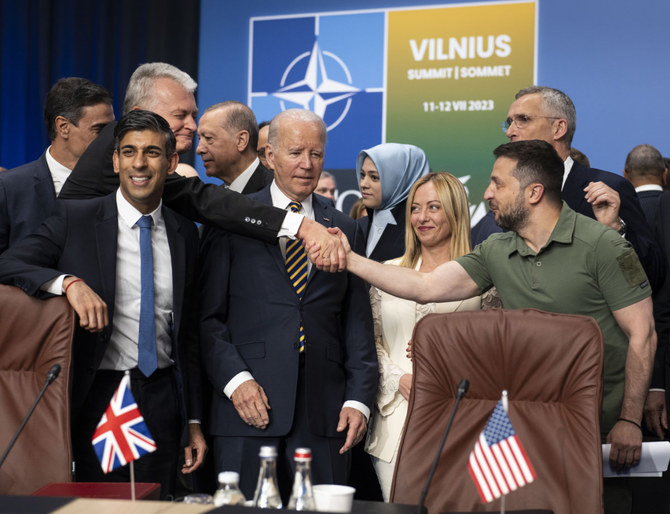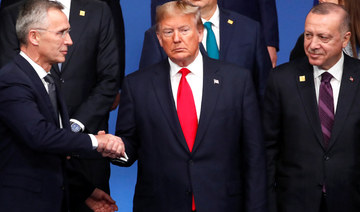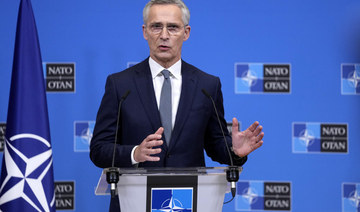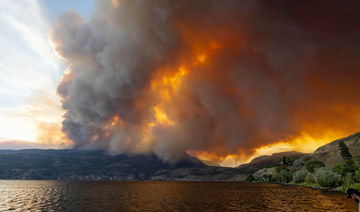LONDON: As chances rise of a Joe Biden-Donald Trump rematch in the US presidential election, America’s allies are bracing for a bumpy ride.
Many worry that a second term for Trump would be an earthquake, but tremors already abound — and concerns are rising that the US could grow less dependable regardless of who wins. With a divided electorate and gridlock in Congress, the next American president could easily become consumed by manifold challenges at home — before even beginning to address flashpoints around the world, from Ukraine to the Middle East.
French President Emmanuel Macron’s recent verdict was blunt: America’s “first priority is itself.”
The first Trump administration stress-tested the bonds between the US and its allies, particularly in Europe. Trump derided the leaders of some friendly nations, including Germany’s Angela Merkel and Britain’s Theresa May, while praising authoritarians such as Turkish President Recep Tayyip Erdogan and Russian leader Vladimir Putin. He has called China’s Xi Jinping “brilliant” and Hungary’s Viktor Orbán “a great leader.”
In campaign speeches, Trump remains skeptical of organizations such as NATO, often lamenting the billions the US spends on the military alliance whose support has been critical to Ukraine’s fight against Russia’s invasion.
He said at a rally on Saturday that, as president, he’d warned NATO allies he would encourage Russia “to do whatever the hell they want” to countries that didn’t pay their way in the alliance. Trump also wrote on his social media network that in future the US should end all foreign aid donations and replace them with loans.
NATO Secretary-General Jens Stoltenberg warned that Trump risked endangering US troops and their allies. “Any suggestion that allies will not defend each other undermines all of our security, including that of the US, and puts American and European soldiers at increased risk,” he said in a statement Sunday.
Biden, meanwhile, has made support for Ukraine a key priority and moral imperative. But Biden’s assertion after his election in 2020 that “America is back” on the global stage has not been entirely borne out. Congressional Republicans have stalled more military aid for Ukraine, while America’s influence has been unable to contain conflict in the Middle East
Thomas Gift, director of the Center on US Politics at University College London, said that whoever wins the presidential race, the direction of travel will be the same – toward a multipolar planet in which the United States is no longer “the indisputable world superpower.”
Most allied leaders refrain from commenting directly on the US election, sticking to the line that it’s for Americans to pick their leader.
They are conscious that they will have to work with the eventual winner, whoever it is — and behind the scenes, governments will be doing the “backroom work” of quietly establishing links with the contenders’ political teams, said Richard Dalton, a former senior British diplomat.
But many of America’s European NATO allies are worried that with or without Trump, the US is becoming less reliable. Some have started to talk openly about the need for members to ramp up military spending, and to plan for an alliance without the United States.
German Chancellor Olaf Scholz said he was “currently on the phone a lot with my colleagues and asking them to do more” to support Ukraine. Germany is the second-largest donor of military aid to Kyiv, behind the US, but Scholz recently told German weekly Die Zeit that the country couldn’t fill any gap on its own if “the USA. ceased to be a supporter.”
Trump’s comments on Saturday about NATO rang alarm bells in Poland, which shares a border with Ukraine. “We have a hot war at our border,” Polish Prime Minister Donald Tusk said Sunday.
He warned: “We must realize that the EU cannot be an economic and civilizational giant and a dwarf when it comes to defense, because the world has changed.”
Russia, meanwhile, is busy bolstering ties with China, Iran and North Korea and trying to chip away at Ukraine’s international support.
Macron also suggested American attention was focused far from Europe. If Washington’s top priority is the US, he said its second is China.
“This is also why I want a stronger Europe, that knows how to protect itself and isn’t dependent on others,” Macron said at a January news conference.
Trump does have supporters in Europe, notably pro-Russia populists such as Hungary’s Orbán. But former British Prime Minister Boris Johnson raised some eyebrows when he argued recently that “a Trump presidency could be just what the world needs.”
Johnson is a strong supporter of Ukraine in its struggle against Russian invasion, whereas Trump has frequently praised Putin and said he’d end the war within 24 hours. However, Johnson said in a Daily Mail column that he didn’t believe Trump would “ditch the Ukrainians,” but instead would help Ukraine win the war, leaving the West stronger “and the world more stable.”
Bronwen Maddox, director of the international affairs think tank Chatham House, said arguments like that underestimate “how destabilizing” Trump has been, and likely would continue to be if reelected.
“For those who say his first term did not do much damage to international order, one answer is that he took the US out of the JCPOA, the deal to curb Iran’s nuclear program. Iran’s acceleration of its work since then has left it a threshold nuclear weapon state,” she said during a recent speech on the year ahead.
Biden was a critic of Trump’s Iran policy but hasn’t managed to rebuild bridges with Tehran, which continues to flex its muscles across the region.
Dalton, a former UK ambassador to Iran, said prospects for the Middle East would be “slightly worse” under Trump than Biden. But he said divergence on the region’s main tensions — the Israeli-Palestinian conflict and Iran’s ambitions — would be limited.
“No US administration is going to make a serious effort to resolve differences with Iran through diplomacy,” Dalton told The Associated Press. “That ship sailed quite some time ago.”
Palestinians and their supporters, meanwhile, implore Biden to temper US support for Israel as the civilian death toll from the war in Gaza climbs. But hard-liners in Israel argue the US is already restraining the offensive against Hamas too much.
Itamar Ben-Gvir, Israel’s far-right national security minister, recently said Biden was not giving Israel his “full backing” and that “if Trump was in power, the US conduct would be completely different.”
Much like its allies, America’s rivals are not openly expressing a preference for the election outcome.
Trump developed a strong rapport with Turkiye’s Erdogan, calling them “very good friends” during a 2019 meeting at the White House.
Yet Turkiye-US relations were fraught during his tenure. The Trump administration removed Turkiye from its F-35 fighter jet project over Ankara’s decision to purchase Russian-made missile defense systems, while Trump himself threatened to ruin Turkiye’s economy.
Russian Foreign Minister Sergey Lavrov told CBS in January that he doesn’t “believe there will be any difference” between a Trump and a Biden presidency. He argued that Russia-US relations have been going downhill since George W. Bush’s administration.
China, where leaders’ initial warmth toward Trump soured into tit-for-tat tariffs and rising tensions, little changed under Biden, who continued his predecessor’s tough stance toward the United States’ strategic rival.
Zhao Minghao, a professor of international relations at Fudan University in Shanghai, said that for China, the two candidates were like “two ‘bowls of poison.’”
Gift, from University College London, said the move to a more fractured world is “going to happen regardless of whether Donald Trump or Joe Biden is elected.”
“It’s just sort of a reality,” he said.
Allies fear the US is becoming less reliable, with growing concern over a possible Trump return
https://arab.news/64uxj
Allies fear the US is becoming less reliable, with growing concern over a possible Trump return

- French President Emmanuel Macron’s recent verdict was blunt: America’s “first priority is itself”
- NATO Secretary-General Jens Stoltenberg warned that Trump risked endangering US troops and their allies
- Many of America’s European NATO allies are worried that with or without Trump, the US is becoming less reliable
Two Americans, one Russian citizen among 20 detained in Georgia, Russia’s TASS reports
- 20 people detained at protests in Tbilisi while Georgian lawmakers were debating a “foreign agents” bill
Russia downs 16 Ukraine-launched missiles, 31 drones

- Russian defense ministry: 12 guided missiles were launched from a Ukrainian Vilkha multiple rocket launcher
- Four Storm Shadow aircraft guided missiles and seven drones were downed over Crimea
The Russian defense ministry said on Monday its air defense systems destroyed 16 missiles and 31 drones that Ukraine launched at Russian territory overnight, including 12 missiles over the battered border region of Belgorod.
Five houses were damaged in Belgorod, but according to preliminary information, there were no injuries, Governor Vyacheslav Gladkov wrote on the Telegram messaging app.
On Sunday, 15 people were killed in Belgorod when a section of an apartment block collapsed after being struck by fragments of a Soviet-era missile, launched by Ukraine and shot down by Russian forces, Russia said.
The Russian defense ministry said on Monday the 12 guided missiles were launched from a Ukrainian Vilkha multiple rocket launcher.
The ministry also said four Storm Shadow aircraft guided missiles and seven drones were downed over Crimea, eight drones were destroyed over the Kursk region and four were intercepted over the Lipetsk region.
A drone sparked a short-lived fire at an electrical substation in the Kursk region, Igor Artamonov, the governor of the region in Russia’s south, wrote on Telegram.
“There are no casualties. The fire in the territory of the electrical substation is being extinguished,” Artamonov said.
Reuters could not independently verify the reports.
There was no immediate comment from Ukraine. Kyiv says that targeting Russia’s military, transport and energy infrastructure undermines Moscow’s war effort and is an answer to the countless deadly attacks by Russia.
Western Canada blazes cause evacuations, air quality concerns

- Authorities issued an evacuation order for a community in British Columbia and warn of poor air quality across provinces
TORONTO: The season’s first major wildfires have spread to roughly 10,000 hectares across Western Canada on Sunday as authorities issued an evacuation order for a community in British Columbia and warned of poor air quality across provinces.
In British Columbia, thousands of residents in Northern Rockies Regional Municipality and Fort Nelson First Nations were evacuated as the nearby blaze nearly doubled to 4,136 hectares.
Northern Rockies Regional Municipality Mayor Rob Fraser in a TV interview said most of the 3,500 residents in and around Fort Nelson had been evacuated.
Fort Nelson First Nation, seven kilometers from the town, also issued an evacuation order for Fontas, an Indigenous community.
Across the border in Alberta, residents of Fort McMurray, an oil hub which suffered extensive damage from wildfires in 2016, were asked to prepare to leave.
However, by the end of the day, favorable weather helped by a shower forecast tamed fire growth at Fort McMurray. Authorities said they expected fire activity to remain low with more showers expected on Monday.
Alberta continued to stress the two wildfires were extreme and out of control and recorded 43 active fires, including one located 16km southwest of Fort McMurray. By Sunday, authorities revised the area affected by fire to 6,579 hectares, much larger than what was reported on Friday.
Fraser said the fire was started by a tree blown down by strong winds falling onto a power line.
Six crews of wildland firefighters, 13 helicopters and airtankers were taming the fire on Sunday, said Alberta authorities.
Evacuation alerts were in place for Fort McMurray, Saprae Creek Estates and expanded to Gregoire Lake Estates and Rickards Landing Industrial Park.
Although there is no immediate risk to these communities, the alert ensures residents are prepared to evacuate if conditions change.
Smoke in Fort McMurray on Saturday was coming from fires in northern British Columbia, Alberta said.
Environment Canada issued a special air quality statement that extends from British Columbia to Ontario on Sunday.
Last year, a veil of smoke blanketed the US East Coast, tinging the skies a fluorescent orange as smoke reached parts of Europe as hundreds of forest fires burnt millions of acres of land and forced about 120,000 people to leave their homes.
The federal government has warned Canada faces another “catastrophic” wildfire season as it forecast higher-than-normal spring and summer temperatures across much of the country, boosted by El Nino weather conditions.
Canada experienced one of its warmest winters with low to non-existent snow in many areas, raising fears ahead of a hot summer triggering blazes in forests and wildlands amid an ongoing drought.
India to sign 10-year pact with Iran for Chabahar port management— report

- India has been developing port to transport goods to Iran, Afghanistan and Central Asia to avoid Karachi
- Sanctions imposed by Washington on Iran have slowed down Chabahar port’s development work
NEW DELHI: India is likely to sign an agreement with Iran on Monday to manage the southeastern Iranian port of Chabahar for the next 10 years, the Economic Times reported.
India Shipping Minister Sarbananda Sonowal is likely to travel to Iran to sign the agreement, the report said, citing unidentified sources.
The Indian government did not immediately respond to a request for comment.
India has been developing a part of the port in Chabahar, which is located on Iran’s southeastern coast along the Gulf of Oman, as a way to transport goods to Iran, Afghanistan and central Asian countries that avoids the port of Karachi in its rival Pakistan.
US sanctions on Iran, however, have slowed down the port’s development.
India vote to resume with Kashmir poised to oppose Modi

- Jammu and Kashmir has deeply resented Modi government’s 2019 snap decision to bring territory under its control
- Rebel groups opposed to Indian rule have waged an insurgency since 1989 on frontier controlled by New Delhi
SRINAGAR, India: India’s six-week election is set to resume Monday including in Kashmir, where voters are expected to show their discontent with dramatic changes in the disputed territory under Prime Minister Narendra Modi’s government.
Modi remains popular across much of India and his Hindu-nationalist Bharatiya Janata Party (BJP) is widely expected to win the poll when it concludes early next month.
But his government’s snap decision in 2019 to bring Kashmir under direct rule by New Delhi — and the drastic security clampdown that accompanied it — have been deeply resented among the region’s residents, who will be voting for the first time since the move.
“What we’re telling voters now is that you have to make your voice heard,” said former chief minister Omar Abdullah, whose National Conference party is campaigning for the restoration of Kashmir’s former semi-autonomy.
“The point of view that we want people to send out is that what happened... is not acceptable to them,” he told AFP.
Kashmir has been divided between India and Pakistan since their independence in 1947. Both claim it in full and have fought two wars over control of the Himalayan region.
Rebel groups opposed to Indian rule have waged an insurgency since 1989 on the side of the frontier controlled by New Delhi, demanding either independence or a merger with Pakistan.
The conflict has killed tens of thousands of soldiers, rebels and civilians in the decades since, including a spate of firefights between suspected rebels and security forces in the past month.
Violence has dwindled since the Indian portion of the territory was brought under direct rule five years ago, a move that saw the mass arrest of local political leaders and a months-long telecommunications blackout to forestall expected protests.
Modi’s government says its canceling of Kashmir’s special status has brought “peace and development,” and it has consistently claimed the move was supported by Kashmiris.
But his party has not fielded any candidates in the Kashmir valley for the first time since 1996, and experts say the BJP would have been roundly defeated if it had.
“They would lose, simple as that,” political analyst and historian Sidiq Wahid told AFP last week.
The BJP has appealed to voters to instead support smaller and newly created parties that have publicly aligned with Modi’s policies.
But voters are expected to back one of two established Kashmiri political parties calling for the Modi government’s changes to be reversed.
India’s election is conducted in seven phases over six weeks to ease the immense logistical burden of staging the democratic exercise in the world’s most populous country.
More than 968 million people are eligible to vote in India’s election, with the final round of polling on June 1 and results expected three days later.
Turnout so far has declined significantly from the last national poll in 2019, according to election commission figures.
Analysts have blamed widespread expectations that Modi will easily win a third term and hotter-than-average temperatures heading into the summer.
India’s weather bureau has forecast more hot spells in May and the election commission formed a taskforce last month to review the impact of heat and humidity before each round of voting.
















